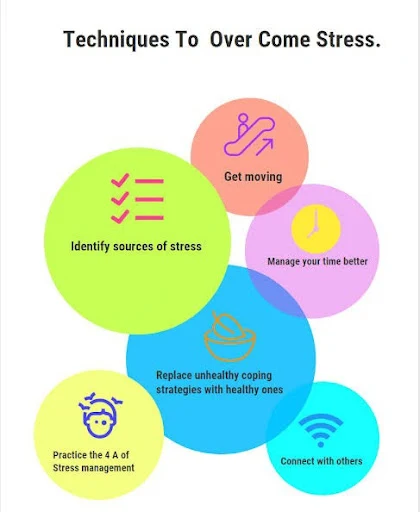Why Stress Occurs and How It Can be Managed? Know Tools and Resources to Relieve from Stress for Your Life to Feel and Function at Your Best!
Stress management is defined as the tools, strategies, or techniques that reduce stress and reduce the negative impacts stress has on your mental or physical well-being. A variety of techniques can be used to manage stress. These include mental, emotional, and behavioral strategies. When stress management is used regularly and in response to stressful life events, we can optimize our well-being. Signs of Stress Stress shows up in the body and mind differently for everyone. Here are some tell-tale signs of stress to look out for:
|
The Symptoms of chronic stress include:
- irritability
- anxiety
- depression
- headaches
- insomnia
Acute stress is a relatively common occurrence. Various events can cause acute stress, like a car accident, losing a loved one, or being diagnosed with a chronic illness. Witnessing a disturbing event and second-hand experiences can also contribute to this type of stress.
Acute stress can also develop in response to positive life events, including a wedding day, childbirth, a new job, or starting college. As mentioned, stress is a natural process we experience as we try new things, grow, learn, and adjust. Eustress can push us to meet and surpass a challenge or find ways to cope. However, acute stress can be concerning and negatively impact your health.
Symptoms of acute stress may include:
- Faster heart rate and breathing rate
- Increased perspiration
- Increased irritability
- Having no or reduced memory of a traumatic event
- Avoiding people, places, or things that remind you of the traumatic event
- Hyperarousal, focus, and energy as blood rushes to your muscles, heart, and organs
- Feeling numb
- Feeling detached from your surroundings
- Having distressing thoughts, dreams, nightmares, and flashbacks of the event
- Having sleep difficulties
- Feeling restless
- Being easily startled
- Having difficulty focusing your attention
- Feeling tense
- Feeling heightened irritability
2. Episodic Acute Stress
Episodic acute stress refers to frequent, consistent, intermittent, or regular stress. This type of stress can occur with one-time or consecutive stressors, such as worrying about a past negative experience or potential future events.
Examples of episodic acute stress sometimes reflect those of non-episodic acute stress, like presenting at work, recurring doctor appointments, or meetings to discuss a divorce. Generally, naturally anxious, irritable, or short-tempered people more commonly experience this type of stress.
Symptoms of episodic acute stress may include:
- Feeling irritable and angry
- Increased heart rate
- Heartburn and indigestion
- Muscle pain and tightness
- Heart disease
- High blood pressure
- Frequent headaches
3. Chronic Stress
It is an ongoing and constant type of stress with no relief. Many different stressors can contribute to prolonged distress and overwhelm, such as abuse, divorce, discrimination, and a lack of support. People with health issues, disabilities, or caregiving obligations commonly report chronic stress.
Symptoms of chronic stress may include:
- High blood pressure
- Higher risk of stroke and heart attack
- Cardiovascular disease
- Type 2 diabetes
- Headaches
- Insomnia and fatigue
- Weakened immune system
- Nausea and digestive problems, including vomiting
- Weight gain
- Fertility and reproductive issues
- Low sex drive
- Memory problems and difficulties concentrating
- Difficulty handling daily responsibilities at work
- Working at home,
- Maintain personal life
- Anxiety
- Negative thinking
- Feeling agitated, helpless, or hopeless
- Depression
- Irritability
- Emotional lability
- Low self-confidence
- Substance use and abuse
- Do Exercise daily
- Take part in physical activity.
- Use Relaxation tools
- Adopt techniques that bring some kind of relaxation.
- Effective Time Management.
- Practice Healthy lifestyle choices.
- Seeking social support wherever you can do
- Bring excellent Mindfulness
- Maintain meditation schedules
- Learn Cognitive-behavioural tools and techniques and apply in your care.
Once you know where your stress is coming from—a relationship, kids, workload, a health problem—you can sometimes reduce or prevent the stress. After giving the matter some focused thought, you may identify practical steps to improve the situation. Even if changing the trigger isn’t possible, a shift in perspective may help mitigate stress. For example, if a friend is pushing your buttons, stepping back and adjusting your expectations may allow you to keep this close bond.
Process / Step 2. Stay connected.
Maintaining, improving, and increasing healthy relationships with supportive friends and family powerfully promotes resilience. Many find that connections with a faith family, neighbors, and even pets, help them feel positive and energetic, even if children and grandchildren aren’t close at hand.
Process / Step 3. Stay active.
Physical activity releases feel-good endorphins. Taking short walking breaks several times a day is a powerful tool for channeling stress. Exercising or joining yoga, dance, or tai chi classes with friends also helps achieve step 2—staying connected.
Process / Step 4. Find your “pause” button.
“After experiencing times of great change, high demand, or significant loss, it’s essential to press pause and rest. Often creating time and space for rest means saying “no” to invitations and requests for help, at least temporarily,” says Callahan. Consider spending quiet time daily: contemplation, reflection, and breathing fosters resilience and calm.
Process / Step 5. Plan your fun.
To prevent the daily rush from consuming your life, plan your fun for the day, week, month, or year. Callahan recommends, “instead of channel surfing, make a date to watch a special program, alone or with a loved one. Plan a monthly game night with friends and ask them to bring goodies to share. Identify fun activities that suit you, and schedule them.”
Process / Step 6. Reframe your thinking about stress itself.
Stress responses, including faster heart rate and breathing, evolved to improve our performance in stressful situations. Reminding yourself of stress’s evolutionary value may improve your performance and paradoxically reduce feelings of stress, in that you’re not adding “stress about stress” to the stress the original trigger aroused.
Ans.: Coping with your problems one at a time helps. But there are certain situations like the death of a loved one, where you may find coping very difficult. Hence, in those situations, you should try first to accept the truth of the situation, and then try to understand your feelings, and only then you should try to manage then. And you can always seek assistance from friends and family for the execution of the last part.
Q.2.: HOW COMMON IS STRESS?
Ans. : There isn’t a single person who doesn’t feel stressed out every now and then. Some people hide it better than others, but that doesn’t mean that they don’t feel it. Though the intensity of the stress varies from person to person, and so does the coping strategies, it is not easy for anyone. And the mere fact that we are all in it together is a source of comfort for many people.
| ||||||||





Comments
Post a Comment
"Thank you for seeking advice on your career journey! Our team is dedicated to providing personalized guidance on education and success. Please share your specific questions or concerns, and we'll assist you in navigating the path to a fulfilling and successful career."